Plant science in the School of BioSciences
The School of BioSciences is dedicated to discovering how plant systems function and to solving the ongoing challenge of maintaining food, health, land and water for society and the planet’s natural and agro-ecosystems.
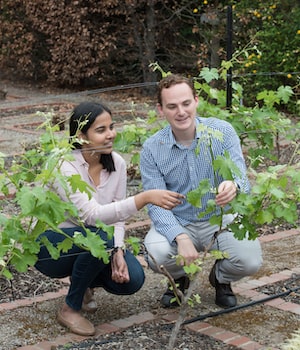
World-class research in plant science
Our research seeks to address major economic, health and environmental challenges of the present and the future. It is enriched by our world class facilities, talented students, international partnerships, and our collaborations with industry, government and the community.
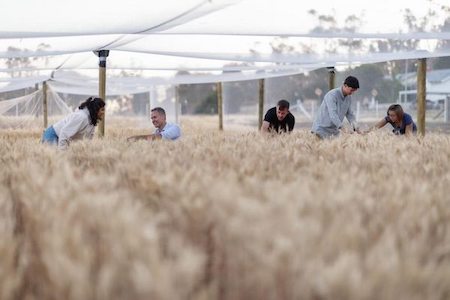
Research highlight: fighting hidden hunger with A/Prof. Alex Johnson
Associate Professor Johnson explores how plants absorb nutrients and the factors affecting nutrient bioavailability in edible parts of plants. Using biofortification, Johnson and his lab redesign wheat, boosting its levels of essential micronutrients such as iron and zinc to increase the nutritional quality of crops.
Facilities and programs
These are some of the facilities and platforms students and staff can access.
-
Advanced Microscopy Facility
The University of Melbourne maintains a state-of-the-art electron and optical microscope facility with nodes located at the Bio21 Institute and the School of BioSciences.
-
Glasshouse Complex
The Glasshouse is a research and teaching facility jointly administered by the Faculty of Veterinary and Agricultural Sciences and the School of BioSciences. Controlled environments include glasshouses, growth rooms and growth cabinets. Other facilities include a plant and soil sample processing laboratory.
-
The University of Melbourne Herbarium (MELU)
Built up over nearly a century, the University of Melbourne Herbarium houses 150,000 specimens of plants, fungi and algae, including historically important collections and artwork.
-
Melbourne Pollen Count
The Melbourne Pollen Count forecasts the level of pollen in the air, alerting those who suffer from hay fever and seasonal asthma of the likelihood of being exposed to high levels of grass pollen.
-
Mass Spectrometer and Proteomics Facility
The Mass Spectrometry and Proteomics Facility provides academic and industry researchers access to specialist mass spectrometry and proteomic equipment and expertise.
Support plant science with the Botany Foundation
The Botany Foundation supports excellence in education and research relating to the use of plants, the environment, food security and nutrition. Funding is given to an array of research areas and programs to assist students and professionals in plant science as well as support to important research facilities such as the University of Melbourne Herbarium.
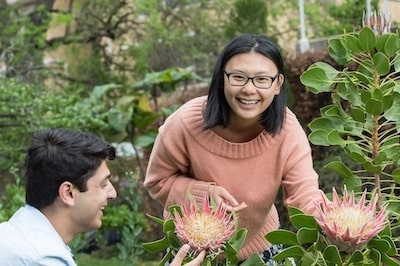
Study plant science with us
Our plant science programs attract talented domestic and international students and graduate researchers. Our diverse undergraduate subjects and Plant Science major foster discovery of the broad areas of plant science, from agriculture to horticulture, and from conservation to biotechnology, whilst learning practical labs skills and enjoying field experiences.
Our graduate programs enable specialisation and the opportunity to be supervised by world class academics, study internationally, obtain industry placements and become a member of the University of Melbourne’s globally significant research community.
Plant Science major Undergraduate subjects Studying plant science
Plant science news
Our research is dedicated to discovering how plant systems function to solve the ongoing challenge of maintaining food, health, land and water for society and the planet’s natural and agro-ecosystems.
Plants offer enormous untapped potential to solve societal challenges, such as:
- Capturing CO2 from the atmosphere, returning oxygen and water to the air, and releasing carbon to soils to build fertility.
- Providing the sugars and proteins that are the foundation of human and animal food, health and building materials, in addition to producing millions of other specialised biochemicals.
- Forming the foundation of urban, forest and agricultural landscapes that give beauty and mental benefits to humans and animals.
The world’s population is projected to reach 9 billion by the year 2050, yet the current practices related to the use of plants for food, medicine, energy and materials are unable to meet this critical demand. We seek to solve what are recognised to be the greatest challenges to face humanity in the next three decades.
Research highlights
Laboratories and research groups
-
Plant Systematics Research Group
The Plant Systematics Research Group studies the phylogeny, classification and biogeography of Australasian plants, including eucalypts, acacias, Eremophila, Nicotiana, Dianella, Grevillea, the family Rutaceae, ferns and bryophytes.
-
Ebert Lab
The Ebert lab aims to understand the mechanisms that drive the controlled assembly of sugars within the secretory pathway, combining cell biology, biochemistry, molecular genetics and evolution with advanced microscopy and mass spectrometry.
-
Adaptive Evolution Lab
The Adaptive Evolution Lab combines experimental and computational approaches to study the effect of environmental variation and stress on natural population, using a range of experimental models to test hypotheses related to climate change and pesticide exposure.
-
Golz Group: Plant Developmental Genetics
The Golz Group's main focus is to understand how complex patterns of gene expression are generated and maintained during cell-type specification and differentiation in multicellular organisms.
-
Haydon Lab: Plant Cell Signalling
The Haydon Lab uses genetics, chemical genetics, molecular biology and biochemistry to understand mechanisms that control circadian rhythms, with a particular focus on metabolic signalling and nutrient balance.
-
Heazlewood Lab: Plant Glycomics
The Heazlewood Lab studies the utilisation of subcellular proteomic data from compartments involved in plant cell wall biosynthesis to investigate protein function and metabolic partitioning.
-
Mycology Laboratory: Fungal biology research
The Mycology Laboratory studies how fungi respond to their environment to change physiology and development, working on multiple and diverse species to address long-standing questions in fungal and eukaryotic biology by comparative approaches.
-
Johnson Lab: Plant nutrition and biofortification of cereal crops
The Johnson Lab employs a variety of molecular tools to discover, characterise and engineer plant genes that are important for the absorption and bioavailability of iron and zinc.
-
Roessner Lab
The Roessner Lab applies a multidisciplinary approach combining analytical biochemistry, biology, microbiology and bioinformatics to unravel the biosynthetic pathways involved in plants, using state-of-the-art mass spectrometry technologies.
-
Watt Group
The Watt Group studies how root-microorganism dynamics can be optimised with genetics or management to save water, land and fertiliser in agricultural and natural systems, to answer one of the great challenges of the future: feeding the growing world population in a dynamically changing environment.
-
Verbruggen Lab: Algal evolution and coral holobiont biology
The Verbruggen Lab carries out an eclectic range of research on algal biology and coral holobiont functioning, including biodiversity, genome biology, photophysiology, molecular phylogenetics and evolutionary biology.
Networks we are part of




Want to be involved in plant science research?
Studying plant science enables students to undertake undergraduate and graduate studies in diverse topics from agriculture to horticulture, to conservation to biotechnology with diverse topics such as single-celled algae, giant eucalyptus trees, ancient ferns, plant toxins and crop plants that supply most of the world’s nutritional needs.
How can I study plant science?
-
The Bachelor of Science with Plant Science Major
The Plant Science major provides a springboard for students entering careers or research in all fields requiring a solid understanding of plants and their environments. Graduates will develop a comprehensive integrated knowledge of the biology of plants as well as both field and laboratory skills.
View -
Master of Science (BioSciences)
Graduates of the Plant Science major can undertake specialist science and environment degrees such as a Masters in BioSciences, Ecosystem Science, Biotechnology, Environmental Science, and Environment and Ecosystem Management and Conservation.
View
Depending on undergraduate subjects undertaken, entry may also be possible into a range of other graduate degrees in fields like medicine, health sciences, business, and more. -
Doctor of Philosophy
Graduates of an Honours year or Masters with a significant research component can choose to study a PhD, under the supervision of top academics.
View
Our current PhD candidates in the plant science research community are undertaking diverse projects from cell wall synthesis and computational analysis of plant cells to plant root performance and crop development.
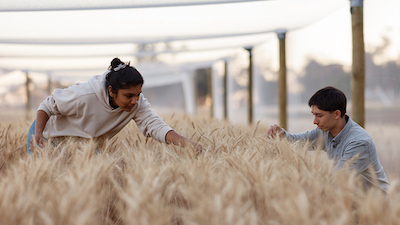
Student highlight: Rucha Patil
Rucha Patil, current Master of Science (BioSciences) student under the supervision of Associate Professor Alex Johnson and Dr. Kate Howell, investigates yeast-bacterium interactions in the sourdough bread system.
Her research has been enhanced by hands-on experiences such as attending Grainz, a three day bakers conference.
I learned about the science of sourdough through learning to bake bread and seeing the bakers handle the dough with such precision. My excitement for the science only grew.
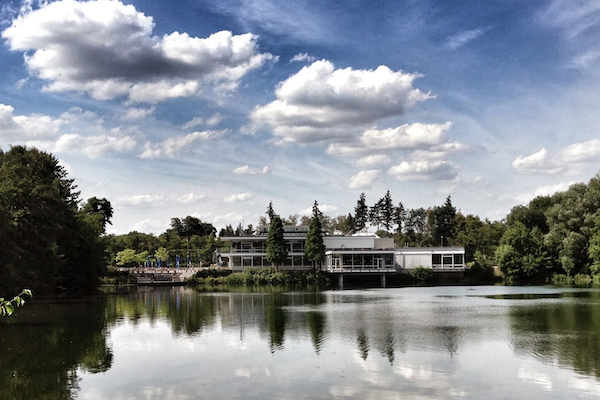
International study in Germany
In the Melbourne-Potsdam PhD Programme (MelPoPP) and the Jülich-University of Melbourne Postgraduate Academy (JUMPA) candidates are supervised by top academics located at the University of Melbourne and prestigious institutions in Germany such as the Max Planck Institute of Molecular Plant Physiology and the Forschungszentrum Jülich GmbH, experience different research environments, gain new cultural perspectives and establish valuable international connections.
Current PhD projects include diverse topics such as:
- The circadian clock
- Sugars and cell wall synthesis
- Computational analysis of plant cells
- Plant root performance and crop development.
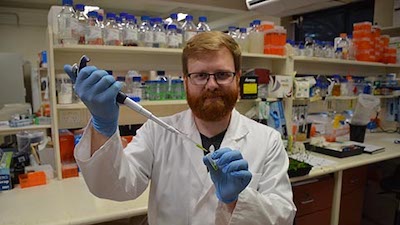
International experience: Mike Ogden
It is very unique to learn in different institutes, surrounded by such a diverse range of passionate researchers across many scientific fields and cultures. Mike Ogden, MelPoPP Candidate
Career pathways
Studying Plant Science can open many careers opportunities in fields such as:
| Agriculture | Biotechnology | Conservation |
| Ecotourism | Education | Forestry |
| Food technology | Horticulture | Resource management |
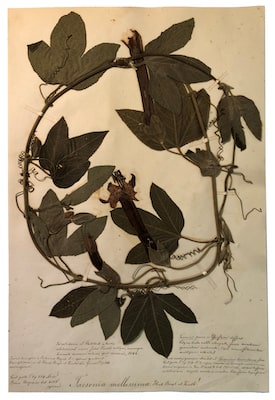
Alumni highlight: Jessica Gardner
Jessica Gardner completed a Master of Science (BioSciences) in 2019 and investigated the horticultural potential and nutritional value of native Australian sweet potatoes. She is now a Senior Curation Assistant at the National Herbarium of Victoria where she studies, processes and mounts plant specimens that are between 100 and 150 years old.
Working on super-old plants is really cool and fun (especially for a plant nerd!) Despite their age, some plants still have green leaves and brightly coloured flowers. Some of the locations and collectors are really interesting too - the other day I came across a specimen that was once part of a collection owned by Prince Roland Bonaparte!
Our plant science researchers are some of the best and brightest from around Australia and internationally, a community of experts who are ranked among the world’s best – by number of citations, awards and grant success, as well as by their excellence in teaching and graduate supervision, rich international networks, and strong community and industry partnerships.

A/Prof. Mike Bayly
Systematic and Evolutionary Botanist, School of BioSciences
- Email Email
- Find an expert Find an Expert profile
- Lab Lab page
- Email Google Scholar
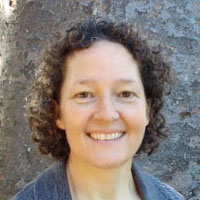
Dr Joanne Birch
Lecturer, Herbarium Curator, School of BioSciences
- Email Email
- Find an expert Find an Expert profile
- Lab Lab page
- Email Google Scholar
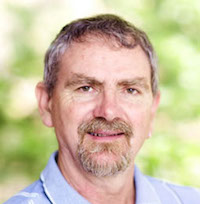
A/Prof. Andrew Drinnan
Reader, School of BioSciences; Director, Herbarium
- Email Email
- Find an expert Find an Expert profile

Dr Berit Ebert
University of Melbourne Botany Foundation Fellow, School Of BioSciences
- Email Email
- Find an expert Find an Expert profile
- Lab Lab page
- Email Google Scholar

Dr Alexandre Fournier-Level
Senior Lecturer, School of BioSciences
- Email Email
- Find an expert Find an Expert profile
- Lab Lab page
- Email Google Scholar

Dr John Golz
Senior Lecturer, School of BioSciences
- Email Email
- Find an expert Find an Expert profile
- Lab Lab page
- Email Google Scholar
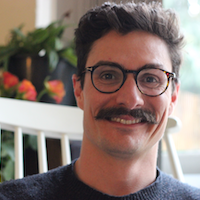
Dr Mike Haydon
Senior Lecturer, Genetics, School of BioSciences
- Email Email
- Find an expert Find an Expert profile
- Lab Lab page
- Email Google Scholar

A/Prof. Joshua Heazlewood
Senior Lecturer, School of BioSciences
- Email Email
- Find an expert Find an Expert profile
- Lab Lab page
- Email Google Scholar

A/Prof. Alexander Idnurm
Associate Professor (Plant Pathology), School of BioSciences
- Email Email
- Find an expert Find an Expert profile
- Lab Lab page
- Email Google Scholar

A/Prof. Alex Johnson
Associate Professor (Plant Biology), School of BioSciences
- Email Email
- Find an expert Find an Expert profile
- Lab Lab page
- Email Google Scholar

A/Prof. Ed Newbigin
Botanist, School Of BioSciences; Coordinator, Melbourne Pollen Count
- Email Email
- Find an expert Find an Expert profile
- Lab Lab page
- Email Google Scholar

Dr Allison van de Meene
BioSciences Microscopy Facility Manager, School of BioSciences
- Email Email
- Find an expert Find an Expert profile
- Lab Lab page
- Email Google Scholar

Prof. Michelle Watt
Adrienne Clarke Chair Of Botany, School Of BioSciences
- Email Email
- Lab Lab page
- Email Google Scholar

A/Prof. Heroen Verbruggen
Associate Professor (Marine Botany)
- Email Email
- Find an expert Find an Expert profile
- Lab Lab page
- Email Google Scholar